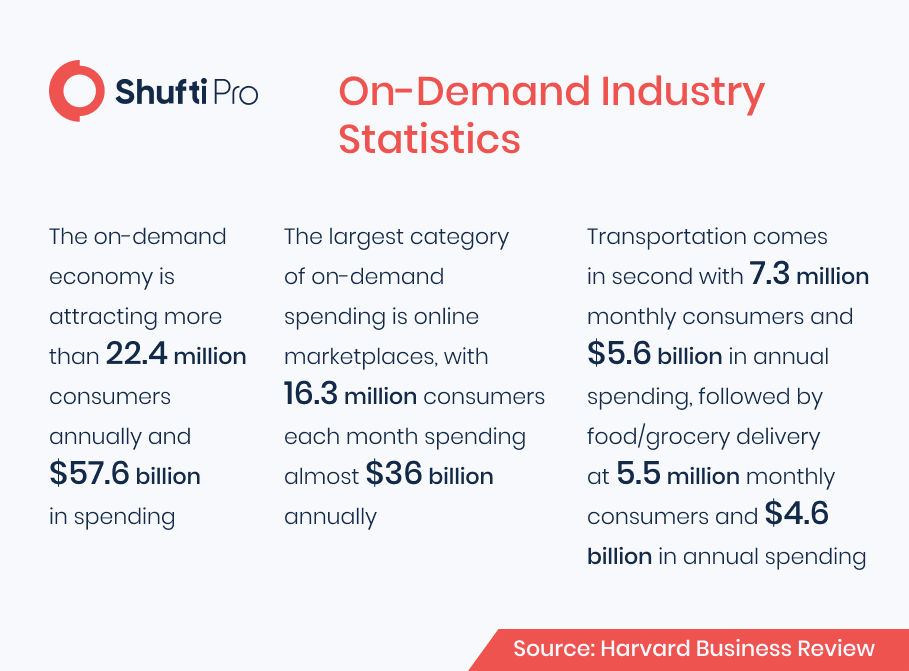Assessing the Importance of Digital Identity Verification in On-Demand Services

Dealing with the after-effects of the coronavirus pandemic, digital business platforms and e-commerce platforms in the UK saw record-high internet penetration rates. According to statistics, 46% of Britain’s population felt that their on-screen time increased during the pandemic. British citizens, particularly those individuals who are linked to e-commerce platforms, now have an average on-screen time of 3.5 hours a day.
The increased use of the internet for services has opened up opportunities as well as given rise to new technology-related concerns. One of the most important aspects of today’s e-commerce platforms is the provision of secure and convenient services to customers.
The Rise of On-Demand Services
On-demand services have emerged as a convenient solution after the COVID pandemic’s restrictions became a barrier to the delivery of services and customers’ satisfaction. The fast-paced development of digital products and services has brought forth many unexpected results in the form of security issues. With the option to choose between hundreds of brands from numerous platforms, customers don’t take too long to drop a specific product due to poor quality of service. For this reason, the adoption of on-demand services has become common across the world. When it comes to online services that involve security checks and payment methods, risks are always imminent. The real question is – what to prioritize while developing or implementing an on-demand service?
On-demand culture is a method to sell products or services to customers based on their requirements. While the priority is satisfying the customers’ requests as per their demand in the shortest possible delivery time, it’s quite ironic when the process is exploited by fraudulent entities.
Fraud in On-demand Services
There are 4 major categories of frauds that target on-demand services by capitalizing on the loopholes in daily operations, payments, and customer support systems.
Account Takeover Fraud
In this type of fraud, the bad actor simply steals the login details of a customer and makes purchases using their money. Account takeover fraud directly harms the reputation of businesses that become the victim due to a lack of identity verification measures. The spread of sensitive information linking to a hacked account on social media or anywhere on the internet is considered a major stain on the reputation of a financial institution.
Chargebacks
Looking from a financial perspective, chargebacks are the most vicious type of fraud affecting on-demand services. In chargeback fraud, the bad actor uses stolen credit card details to make payments and leaves behind a financial deficit for the real customer. Chargeback fraud has the potential to affect 2% of a customer’s total transactions if there are no security checks in place.
Terms of Service Fraud
Terms of service fraud are carried out not only by fraudsters but also by legitimate customers to make the most of a limited time offer or voucher. The commonly reported concerns include re-using and sharing vouchers, as well as using a return policy in the wrong way. Apart from affecting an on-demand service provider financially, this type of fraud costs more due to the extra calls and investigations to resolve such a matter.
Fraudulent Suppliers
Suppliers often sell out and get involved with bad actors to benefit from stolen payment information for larger supply orders. This type of fraud also costs the business heavily because of the subsequent investigations and risk mitigation expenses. It also ruins the business trust in the market.
KYC Compliance in the On-Demand Sector
On-demand culture originated in the 21st century when customer convenience became a priority of major service providers. The most common application of on-demand services is in mobile devices, where customers demand the best-in-market solutions including financial applications, instant messaging, and browsers. The requirement for mobile services that are available anywhere at any time significantly increased during the Covid-19 pandemic.
That being said, even when on-demand services are as per the demand of customers, they do not feel secure while sharing their personal information online. For this reason, there is an increased need for equally efficient identity verification solutions that are accurate, fast, and support a wide range of identity documents.
Research has shown that 85% of the internet users in the UK prefer to access it through their mobile devices rather than computers. Keeping this in mind, digital identity verification service providers have designed the software to run seamlessly on all kinds of platforms while also being compliant with on-demand services.

Ensuring Security for Digital Services
The popularity of on-demand services in the UK can be seen by the total of 939 million contactless transactions in 2021. With more and more people opting for digital operations, there is a subsequent increase in the demand for internet security. The definitive solution to the security problem is digital identity verification. For on-demand service providers to be successful in today’s digital economy and provide top-notch services, it is essential to prioritize the protection of the customers’ personal information.
Online identity verification allows on-demand service providers to validate the identity of their customers within a matter of seconds. Moreover, it eliminates fraudulent entities from accessing on-demand services using stolen credentials. Another important aspect of online identity verification is the convenience provided to customers along with a promise of security – as all they are required to do is upload a scanned copy of their ID document and a selfie.
The UN considers the need to establish trust and security in digital products and on-demand services, which can be seen in its ID4D initiative in cooperation with the World Bank. The initiative aims to create a digital identity system where every individual in the world will have a legal identity by the year 2030.
The UK Government’s Take on On-Demand Services
When it comes to the UK government, there are still concerns arising from the national digital identity project that has not exactly been implemented as planned. The country has yet to establish a national standard for identity verification, which means that the project is far behind its deadlines. However, the UK government understands and works towards mitigating the risks arising from loopholes in digital security systems.
It also recognizes that the complete digitization of identities is an important aspect of financial inclusion and security in the country. After further amendments to the regulations for financial operations, the government is now taking steps to ensure that on-demand service providers incorporate robust identity verification measures within their systems.
What Shufti Offers
While modern digital identity verification solutions may not be very easy to understand, they are actually based on a complex architecture of AI and machine learning algorithms. These robust identity verification solutions take in large chunks of data and process them simultaneously to analyse the risk factors. Apart from mitigating the risks and eliminating bad actors from an on-demand service platform, Shufti’s robust identity verification solution helps them comply with global regulations.
Shufti is trusted by financial institutions, businesses, and industry leaders in 230+ countries for verifying identity documents in 150+ languages. Shufti’s identity verification solution is the perfect fit for on-demand businesses to solve the fraud problem as it uses thousands of AI models to verify identities with an accuracy of 98.67%.
Want to learn more about our identity verification solution for your on-demand business?

 Explore Now
Explore Now













